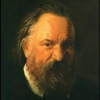Alexander Herzen

Alexander Herzen
Aleksandr Ivanovich Herzenwas a Russian writer and thinker known as the "father of Russian socialism" and one of the main fathers of agrarian populism. He is held responsible for creating a political climate leading to the emancipation of the serfs in 1861. His autobiography My Past and Thoughts, written with grace, energy, and ease, is often considered the best specimen of that genre in Russian literature. He also published the important social novel Who is to Blame?...
NationalityRussian
ProfessionJournalist
Date of Birth6 April 1812
CountryRussian Federation
Every man who has lived for fifty years has buried a whole world or even two; he has grown used to its disappearance and accustomed to the new scenery of another act: but suddenly the names and faces of a time long dead appear more and more often on his way, calling up series of shades and pictures kept somewhere, "just in case," in the endless catacombs of the memory, making him smile or sigh, and sometimes almost weep.
I believe what I write to be the truth...every man who is not indifferent to the truth has a weakness for spreading it about.
It seems to me that you are solving a problem which goes beyond the limits of physiology in too simple a way. Physiology has realized its problem with fortitude, breaking man down into endless actions and counteractions and reducing him to a crossing, a vortex of reflex acts. Let it now permit sociology to restore him as a whole. Sociology will wrest man from the anatomical theatre and return him to history.
Strong drink stupefies a man and makes it possible for him to forget; it gives him an artificial cheeriness, an artificial excitement; and the pleasure of this state is increased by the low level of civilization and the narrow empty life to which these men are confined.
If nations always moved from one set of furnished rooms to another -- and always into a better set -- things might be easier, but the trouble is that there is no one to prepare the new rooms. The future is worse than the ocean -- there is nothing there. It will be what men and circumstances make it.
Modern Western thought will pass into history and be incorporated in it, will have its influence and its place, just as our body will pass into the composition of grass, of sheep, of cutlets, and of men.
Never was Catholicism, never were the ideas of chivalry, impressed on men so deeply, so multifariously, as the bourgeois ideas.
One must open men's eyes, not tear them out.
I am truly horrified by modern man. Such absence of feeling, such narrowness of outlook, such lack of passion and information, such feebleness of thought.
If nations always moved from one set of furnished rooms to another - and always into a better set - things might be easier, but the trouble is that there is no one to prepare the new rooms. The future is worse than the ocean - there is nothing there.
No one is to blame. It is neither their fault nor ours. It is the misfortune of being born when a whole world is dying.
Would it be possible to stand still on one spot more majestically - while simulating a triumphant march forward - than it is done by the two English Houses of Parliament?
People who have realized that this is a dream imagine that it is easy to wake up, and are angry with those who continue sleeping, not considering that the whole world that environs them does not permit them to wake. Life proceeds as a series of optical illusions, artificial needs and imaginary sensations.
It must not be thought that the cowardly feeling of caution and uneasy self-preservation is innate in the English character. It is the consequence of a corpulence derived from wealth and of the training of all thoughts and passions for acquisitiveness.